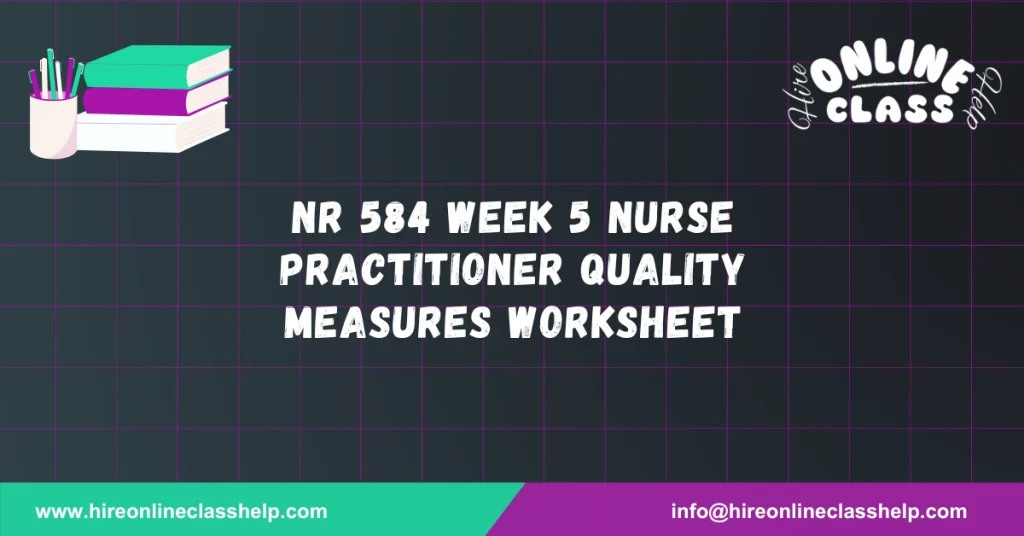






Name
Chamberlain University
NR-584: Quality and Safety for Advanced Nursing Practice
Prof. Name
Date
Name:
Carefully read the assignment guidelines and rubric and complete each section of the worksheet below using complete sentences.
The National Committee for Quality Assurance (NCQA) plays an essential role in ensuring the quality of healthcare delivery by using structured performance standards. One of its primary tools is the Healthcare Effectiveness Data and Information Set (HEDIS), which is widely used by millions of health insurance providers to monitor care quality.
HEDIS is organized into six domains of care, each emphasizing a unique aspect of patient-centered healthcare quality:
| HEDIS Domain | Focus Area |
|---|---|
| Effectiveness of Care | Evaluates clinical interventions and treatment outcomes |
| Access/Availability of Care | Measures the ability of patients to obtain timely healthcare services |
| Experience of Care | Examines patient satisfaction and overall care experiences |
| Utilization & Risk-Adjusted Utilization | Tracks efficiency in resource use and risk-adjusted patient needs |
| Health Plan Descriptive Information | Provides data on healthcare organizations and systems |
| Measures Collected Using Electronic Clinical Data Systems | Focuses on data-driven quality reporting using EHR and digital systems |
For this worksheet, a NCQA HEDIS performance measure relevant to future nurse practitioner practice has been selected and evaluated.
The performance measure chosen is “Controlling High Blood Pressure”, which is vital for preventing long-term cardiovascular complications.
Managing hypertension is a critical clinical priority, as nearly half of U.S. adults suffer from high blood pressure (≥130/80 mmHg) or are prescribed antihypertensive medications (Hannan et al., 2022). Poorly controlled hypertension significantly elevates the risk of stroke, kidney failure, and heart disease.
Evidence consistently shows that effective hypertension management reduces morbidity, mortality, and overall healthcare costs. Clinical trials also highlight that proactive interventions—such as early screening, routine monitoring, and lifestyle modifications—substantially improve patient outcomes.
For a Family Nurse Practitioner (FNP), the practical applications include:
Patient Education: Teaching patients about lifestyle changes, medication adherence, and regular monitoring.
Standardized Protocols: Implementing structured guidelines for diagnosing and treating hypertension across patient populations.
Quality Improvement: Routinely reviewing outcomes to ensure effectiveness and modify treatment plans when necessary.
| Strategy | Implementation Method |
|---|---|
| Client Education | Develop easy-to-read pamphlets and digital tools about diet, exercise, and medication adherence. Conduct seminars on hypertension awareness and train patients on self-monitoring with home BP devices (Verma et al., 2021; Kitt et al., 2019). |
| Clinical Workflow Integration | Incorporate BP measurement into every routine visit. Schedule follow-ups for treatment review and adjustment. |
| Documentation | Standardize EHR entries for BP readings, treatment adjustments, and follow-up care. Implement tracking systems for patient adherence and progress. |
To monitor the outcomes of hypertension control, the following tools will be used:
Electronic Health Records (EHR) tracking systems for recording BP trends.
Patient satisfaction surveys to assess understanding and adherence.
Remote Patient Monitoring (RPM) devices, such as wireless BP cuffs, to transmit real-time data to providers (Kitt et al., 2019).
RPM tools should be rolled out with training for both patients and providers. Continuous monitoring of patient outcomes and feedback loops will ensure quality. Support services—such as helplines or online troubleshooting resources—can improve patient engagement and adherence.
Effective hypertension management prevents cardiovascular events and improves patient longevity and quality of life. Education combined with routine monitoring empowers patients to manage their health better and reduces preventable complications.
Controlling hypertension can cut down on expensive emergency visits, hospital admissions, and dialysis costs related to kidney failure. Preventive care—including lifestyle modifications and early interventions—saves long-term healthcare expenditures (Ghodeshwar et al., 2023).
Patient satisfaction increases when they are actively engaged in their care. Simplified education and improved outcomes enhance trust in providers, resulting in better NP performance metrics and higher patient satisfaction scores.
Using NCQA HEDIS measures in clinical practice promotes standardized care, accountability, and continuous improvement. For NPs, they provide benchmarks to assess performance and ensure alignment with best practices, leading to safer, evidence-based patient care.
Preventive Care Priority: Hypertension management should be addressed early to prevent complications like stroke and kidney failure. Preventive care reduces long-term costs and enhances population health.
Patient Engagement: Empowering patients through education and active involvement in their care enhances treatment adherence and long-term outcomes. Building trust and communication is vital for successful practice.
Ghodeshwar, G. K., Dube, A., & Khobragade, D. (2023). Impact of lifestyle modifications on cardiovascular health: A narrative review. Cureus, 15(7), e42616. https://doi.org/10.7759/cureus.42616
Hannan, J. A., Commodore-Mensah, Y., Tokieda, N., Smith, A. P., Gawlik, K. S., Murakami, L., Cooper, J., Koob, S., Wright, K. D., Cassarino, D., Arslanian-Engoren, C., & Melnyk, B. M. (2022). Improving hypertension control and cardiovascular health: An urgent call to action for nursing. Worldviews on Evidence-Based Nursing, 19(1), 6–15. https://doi.org/10.1111/wvn.12560
Kitt, J., Fox, R., Tucker, K. L., & McManus, R. J. (2019). New approaches in hypertension management: A review of current and developing technologies and their potential impact on hypertension care. Current Hypertension Reports, 21(6), 44. https://doi.org/10.1007/s11906-019-0949-4
Verma, N., Rastogi, S., Chia, Y. C., Siddique, S., Turana, Y., Cheng, H. M., Sogunuru, G. P., Tay, J. C., Teo, B. W., Wang, T. D., Tsoi, K. K. F., & Kario, K. (2021). Non-pharmacological management of hypertension. Journal of Clinical Hypertension, 23(7), 1275–1283. https://doi.org/10.1111/jch.14236